Art and music are integral parts of St Jude's curriculum, helping to deliver a holistic education that allows students to develop real-world skills and self-confidence. Our teachers’ dedication in every lesson contributes to this ethos.
“Grab your soap and let's get carving!” Mr Kephas says to his students.
To demonstrate the process of sculpting, he turns on a projector and monitors each student.
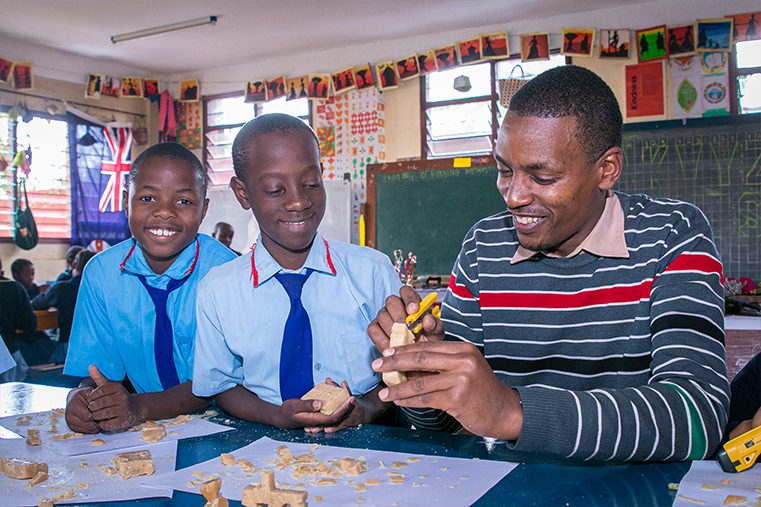
"Today's lesson is about carving with soap. Soap carving inspires creativity in students, especially younger ones," explains Mr Kephas.
"I teach Standard 1 to 7 in primary school and Form 1 and 2 at our girls' secondary school. I am, however, always available to assist older students in their spare time,” says Mr Kephas.
Having begun his artistic journey at a young age, Mr Kephas understands the importance of nurturing talent at an early age.
“I have loved art since I was a child. I would go through my brother's school books, drawing on them. I remember I would get in trouble for that," chuckles Mr Kephas.
"But, my parents noticed my talent and supported me by giving me papers and pencils that I could use for drawing," he adds.
"Students learn soft skills such as time management and teamwork through art. It helps them develop social and emotional skills as well. We can develop well-rounded individuals by cultivating these qualities from an early age,” emphasises Mr Kephas.
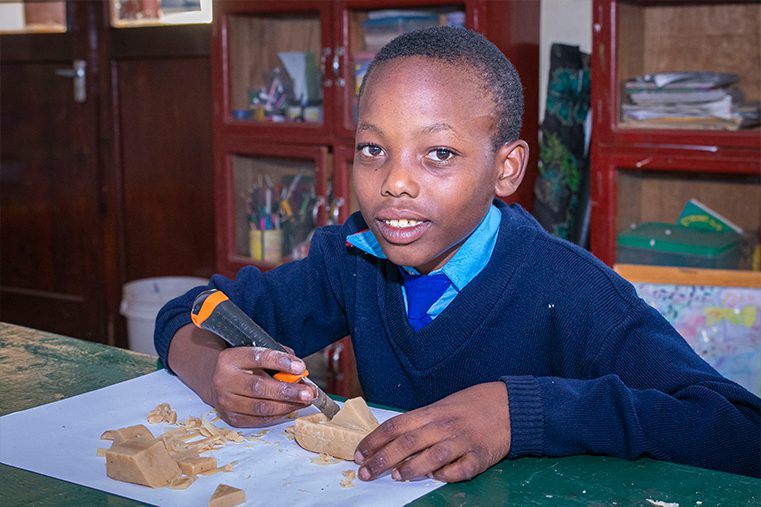
George, a Standard 5 student, is thrilled with today's lesson. "I'm carving a boat today,” he says.
“Art lessons are so much fun for me. I get to learn how to make things in different ways," George adds with enthusiasm.
In the music classroom, more laughter and excitement can be heard. Mr Beda has been a music teacher at St Jude’s for 13 years.
Like Mr Kephas, Mr Beda is passionate about inspiring students' innovative spirit and watching their imagination come to life.
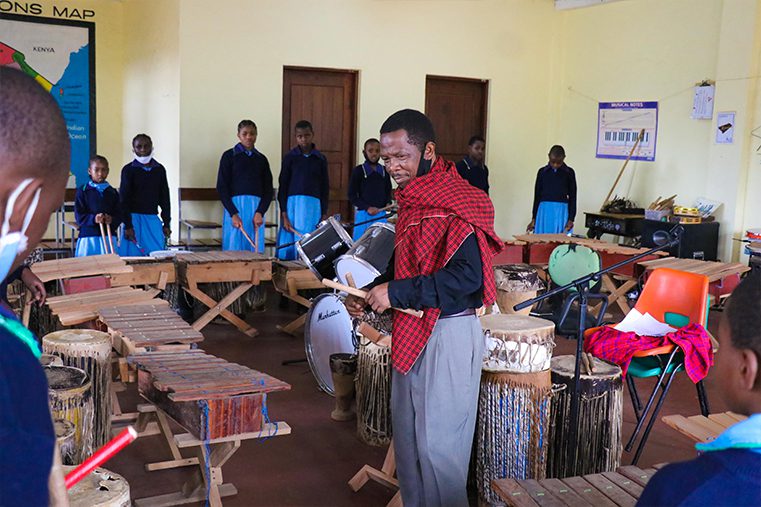
“Coming from a musical background, I love music. The art of music goes beyond singing… it's about learning sounds, the music language and the instruments.”
“I help my students develop their talent by practising. I teach them how to play both traditional and modern instruments.”
“Music stimulates creative thinking. Even if students don't pursue music careers in the future, they learn how to be expressive and gain the confidence to try new things without fear of failure,” explains Mr Beda.
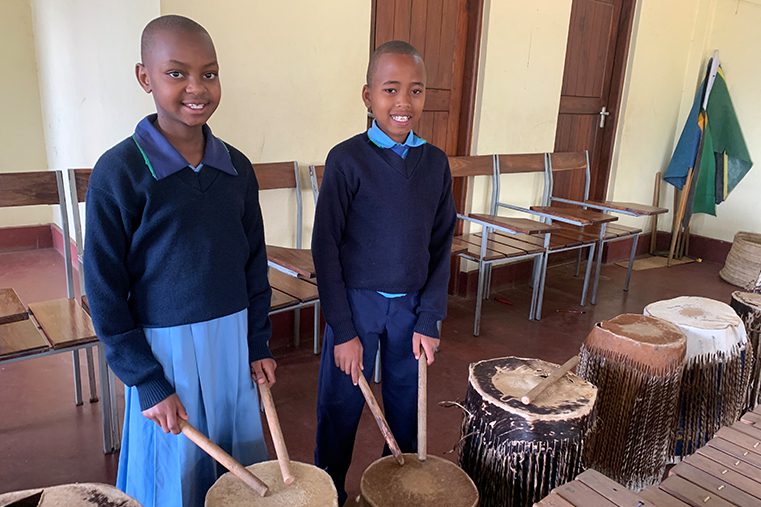
Learning how to play the drums are Joan and Joshua, Standard 4 students. "Music helps us learn about our traditional dances and culture. We also learn to dance, play instruments, and sing," says Joan.
"Mr Beda is teaching us how to play the national anthem on the drums," describes Joshua.
Joan hopes to one day be a music teacher, "I want to pursue teaching music after I complete my higher education."
St Jude's encourages students to express themselves through art and music, transforming their creative energy into beautiful works of art and empowering them with skills to help them thrive in the future.
St Jude’s students come from families who don’t have many material things to share, indeed, many are struggling to make ends meet. Despite this, our students are always looking for ways to give to others.
A group of kind students from St Jude’s Girls’ Secondary School have made it their mission to visit local orphanages during their school holidays. While the students don’t have money to donate, they give staple foods, help with homework, play with the children and help with chores around the orphanage. With compassion and creativity, the students have found a way to make a difference in the community with few resources.
Salome, Form 2, and Caroline, Form 4, are two students who have taken it upon themselves to volunteer their time in orphanages during school holidays this year. They are members of the YOTA (Youth of Tanzania) Club – its current and former Presidents respectively. One of the core purposes of YOTA Club is to serve the community, which is what drew both students to the club.
“Instead of just staying at home during the holidays, we can help people,” explains Salome. “We can contribute to the children at the orphanage by volunteering and bringing items to help them, like sugar, soap, rice and pencils.”
“Our goal is to help our society. We also want to create a spirit of thanksgiving and hard work among our members,” says Caroline.
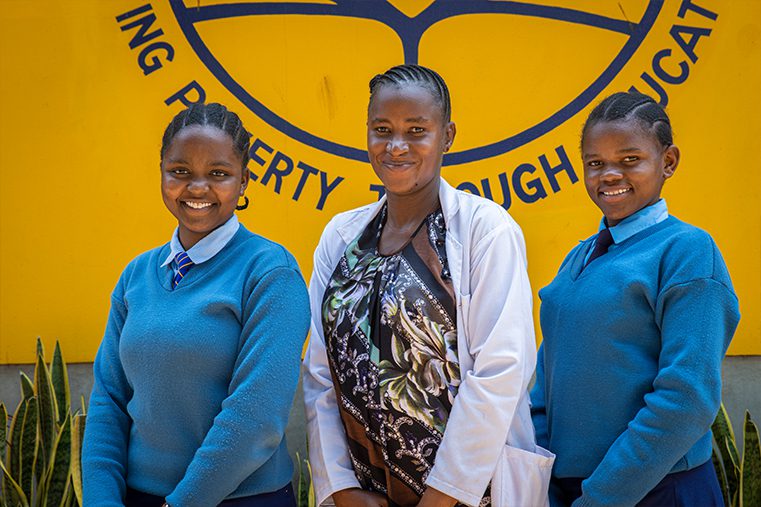
The YOTA Club, like all clubs at St Jude’s, has a staff mentor to guide its activities. Ms Kimori, a lab technician, is the YOTA Club mentor. While she offers a guiding hand, she has found the students very capable of planning their own activities.
“The students proposed the volunteering and asked me if they could visit orphanages,” Ms Kimori recalls. “Once they had permission, they organised it all themselves.”
On the day of the visit, the students make their own way to the orphanage using public transport or on foot.
“When we arrive, we help them to get ready and with activities in their house,” begins Salome. “Then we teach them games, feed them and wash their clothes for them,” continues Caroline.
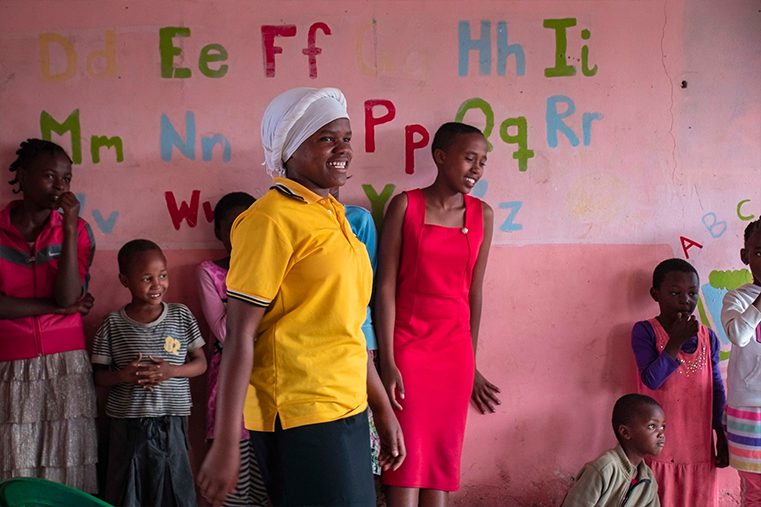
At the orphanage, there about 50 children, from babies to 17 year olds.
“Most orphanages in Tanzania depend on contributions from donors, so it can be difficult. Often, they will have just two or three staff caring for all the children,” explains Ms Kimori.
“Sometimes, the children have just one meal per day,” adds Salome.
It’s clear that the children at the orphanage are happy to spend time with the St Jude’s students. By feeding the youngest children and taking care of some laundry, the students are able to help the staff, who have a lot on their hands with so many young children to care for.
But it’s not all hard work. St Jude’s students all agree that they have a lot of fun while volunteering.
“It’s so nice to spend time with children,” enthuses Salome. Caroline agrees. “I really love volunteering. I know I’m making an impact,” she smiles.
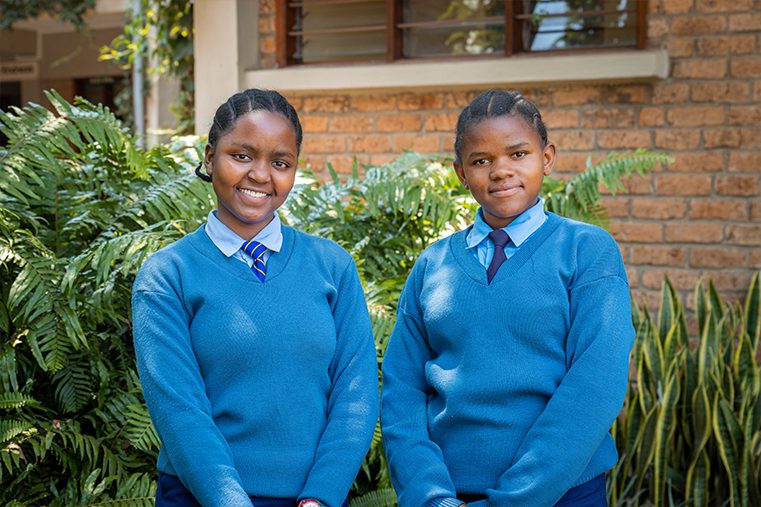
Salome and Caroline, while wonderful students, are not anomalies at St Jude’s. In fact, the spirit of volunteering is strong throughout the student body.
Despite coming from underprivileged backgrounds themselves, St Jude’s students consider those who have less than they do – including those without parents, families or homes. With creativity, our students have found ways to help others using what they have, a skill which will stand them in good stead for a life of kindness and compassion.
As the bell rings, students are excited to be heading home for their midterm break.
Half way through each term, students return to their homes to spend time with their families. As most students enjoy their holidays relaxing with their loved ones; Semu, Jessica, Andrea, and Veronica use this time to give back to the community, as one way to appreciate the free, quality education they receive at The School of St Jude.
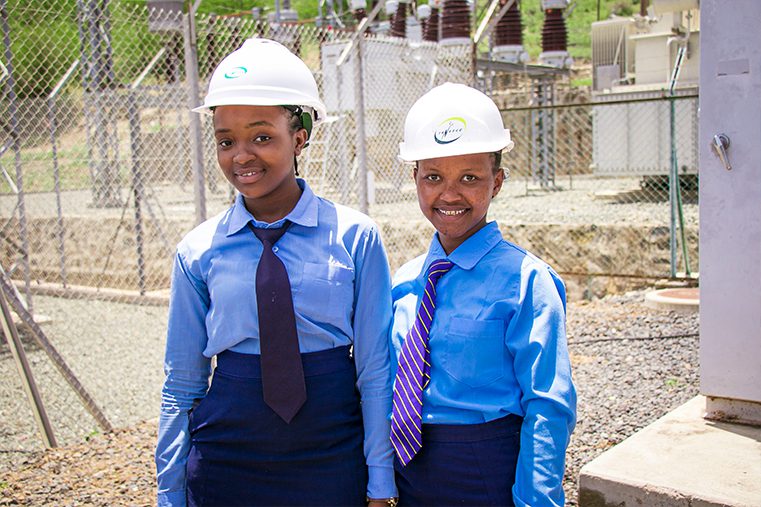
“Charity begins at home,” says Veronica, a Form 4 science student at St Jude’s Girls’ Secondary School.
Veronica spends most of her holidays working in different orphanages around her area. "I started visiting different orphanages in Form 2 and have been going ever since. Having access to the free, quality education I receive at St Jude's has inspired me to help others in the same way I have been helped at the school," explains Veronica.
Veronica and a few of her friends have started a campaign titled, ‘Who has the Voice to Speak for a Girl’, because they want to see a change in their community and see girls, like them, rise up and have access to equal opportunities. She believes that even a little bit of help goes a long way towards helping other girls.
"Girls studying in government schools face many challenges. My friends and I decided to help them in different ways, like tutoring students in the subjects they need help with and donating sanitary towels to girls in several orphanages.”
Despite coming from extremely poor backgrounds, St Jude's students work hard to fulfil their academic potential and to develop leadership skills to lift their communities out of poverty.
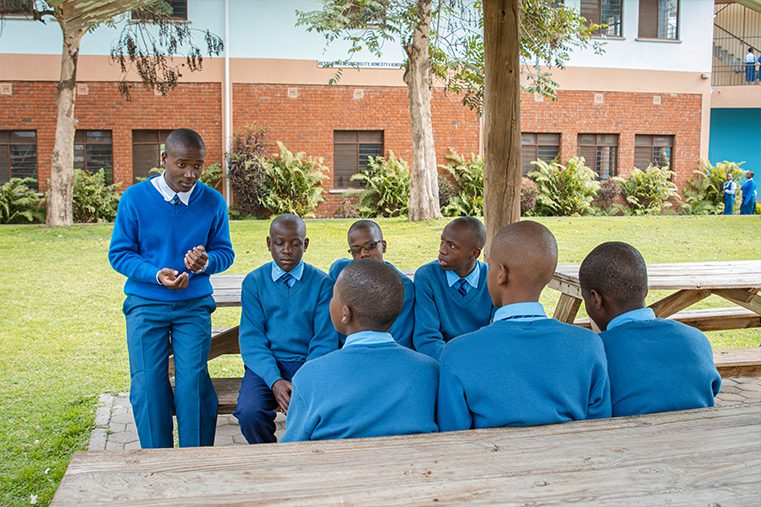
Semu, a Form 6 student at St Jude’s Secondary School, embodies the spirit of leadership. He's dedicated to helping his fellow youth in his community who are struggling with drug abuse. He believes that transforming the socio-economic future of his family and community rests on his shoulders.
"Many of my peers in my neighbourhood suffer from addiction, and that's why I'm compelled to speak out against it," states Semu.
"I use my holiday time to talk to my fellow peers about the negative effects of drug abuse."
"I started a movement called Me Against Drug Abuse (MADA) where I speak to youth in government schools, churches, and in my community about the adverse effects of drug abuse," adds Semu, whose dream is to see a drug-free society one day.
St Jude’s motto is ‘Challenge Yourself’. It encourages students to strive for academic excellence, moral excellence and to develop a diverse set of skills, preparing them to become community-focused leaders of the future.
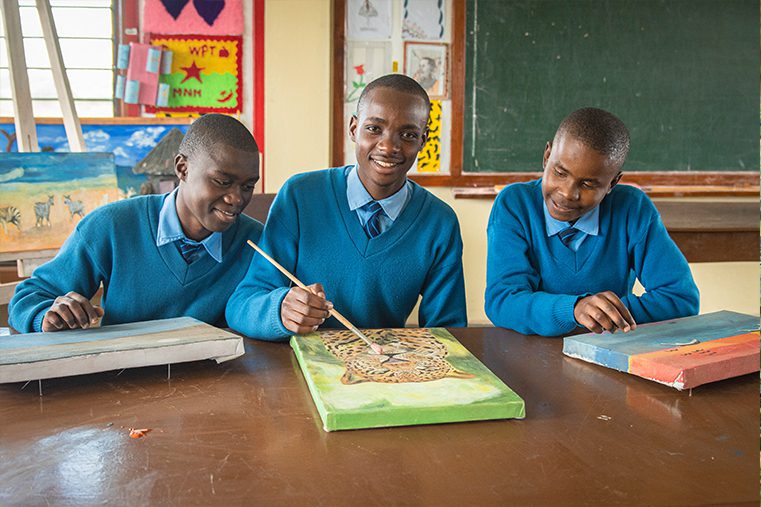
Andrea, a Form 4 student, spends his holidays teaching art to orphans. "During the holidays, I spend my time teaching creative art to orphans and the less fortunate."
"I enjoy sharing the knowledge I gain at St Jude's with my peers, younger brothers and sisters in my community. In addition to teaching them different art skills, I also show them how to weave vases and make bracelets," says Andrea.
St Jude's students are provided with a holistic education to help them develop valuable, real-world skills and self-confidence.
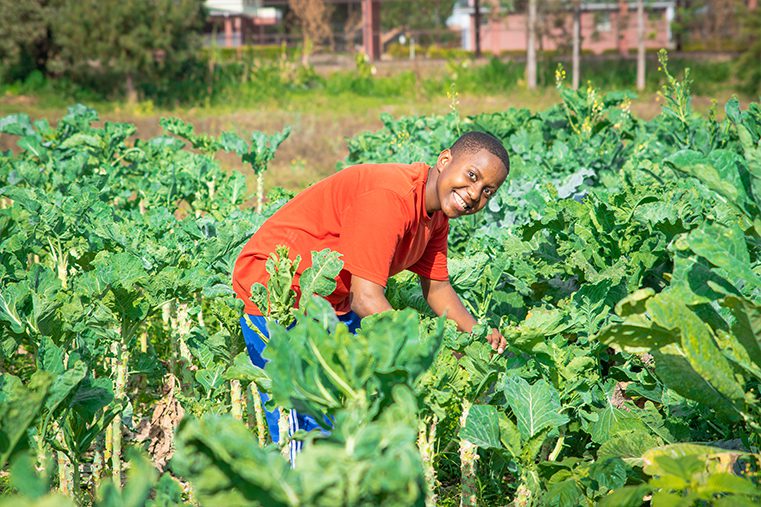
"I have a farm at home, so during the holidays, I tend to the vegetables," says Jessica, a Form 6 student.
Jessica gains her agricultural know-how from tending to the school shamba (shamba means farm in Kiswahili), which is a compulsory activity for students. Through shamba activities, students increase their knowledge about crop management and techniques to improve land productivity.
Agriculture plays a major part in the Tanzanian economy with most Tanzanians involved in agriculture in some way.
“I engage in vegetable farming during holidays because farming contributes to feeding my family. With the farm now up and running, they'll have an endless supply of vegetables," Jessica adds.
Jessica, Semu, Andrea and Veronica don’t stop learning when the school closes, they use creative ways to reach out and help their communities during the holidays. As outstanding St Jude’s role models, they demonstrate that education creates hope for the future of Tanzania.
While the morning dawns grey and dull, Cultural Day at St Jude’s Girls’ Secondary School is a celebration of colour and energy.
Today is a day for students to celebrate and learn about Tanzanian cultures. With the help of teacher mentors, they’ve prepared performances, artworks and traditional dishes around the theme ‘Development Though Culture’.
“Culture has significance. It is an instrument for education. So we want to instil in our students the ability to love and embrace their culture,” explains Mr Chokora, an English and geography teacher. Observing the excited students this morning, it’s clear that St Jude’s is succeeding in this quest.
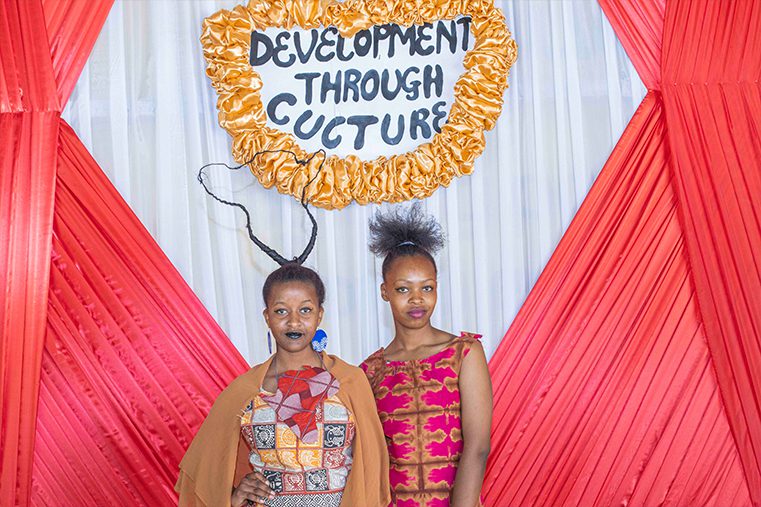
The show begins with a bang: first up are the ngoma groups (in Kiswahili, ngoma refers to traditional dancing with drums). The students are dressed in bright costumes, their hair styled in intricate braids and buns. Oprah, from Form 2, is dancing with the Africana ngoma group today. She is from the Bondei tribe who are historically based in the Tanga area, on Tanzania’s Northeast coast. “I really enjoy performing,” she says. “It’s important to show our culture and share it with everyone.”
Next come the choirs, who share songs in Kiswahili. Then, for a humorous interlude, the audience are treated to a series of short dramatic acts, written and performed by the students.
The final section of the program is dedicated to a fashion show. Student designers have dreamed up and created inventive outfits. Their friends model the designs, showing off the bold creations.
One talented designer is Sabha, in Form 4. Her collection, called African Diva, demonstrates ingenious use of recycled materials. She explains, “When you look at the environment, you can see inspiration everywhere.”
Some people look at fashion as a frivolous pursuit, but not Sabha, who hopes to pursue a career in design. “A key element of culture is dress. Here in Tanzania we have many tribes and each has their own way of dressing.” Sabha is a member of the famous Maasai tribe and says Cultural Day is one of her favourite days of the year. “It’s a chance for people to show their creativity and their talents,” she beams.
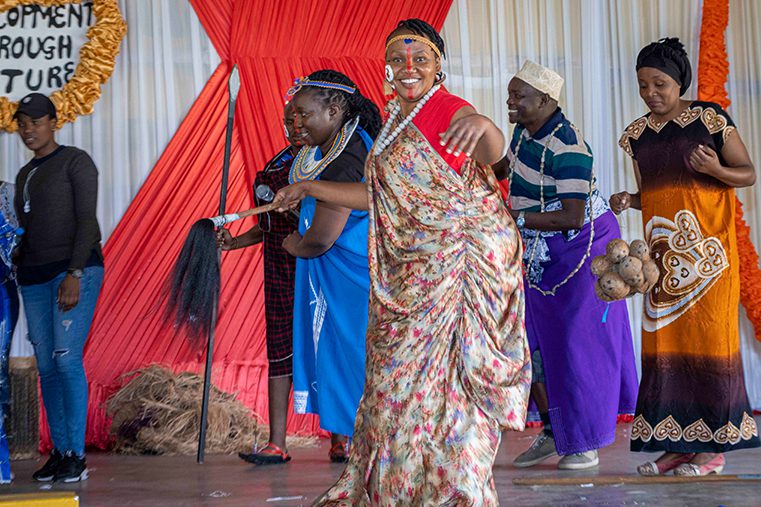
Perhaps the most keenly anticipated performance of the Cultural Day is the teachers’ dramatic performance. Almost all teachers at the school have been involved in writing, rehearsing and performing a funny act, which demonstrates the importance of appreciating culture.
“I take part in Cultural Day to model cultural appreciation to the students. Culture is part and parcel of human life, so I want to show them that participating in culture is not something bad or embarrassing. As staff, we want students to develop an interest in embracing their cultures,” enthuses Mr Chokora, a teacher who is part of today’s performance.
Another performing teacher is Miss Doreen, who teaches Kiswahili. “I really like to perform, because we want to show our students that we’re capable of doing anything. Even though we are very busy we are still capable. We still have time for culture,” she explains.
Miss Doreen and Mr Chokora are pleased to see that their efforts have helped the students take an interest in culture. “They have been asking what we’re doing for weeks, but we wanted to surprise them,” says Mr Chokora.
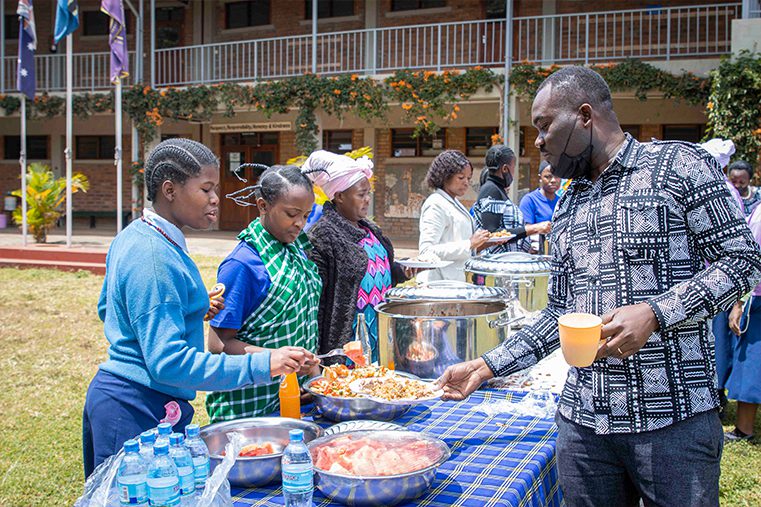
After a morning of performances, everyone has worked up an appetite. Luckily, students have prepared an array of dishes from all over Tanzania for their guests to enjoy. Veronica and Maria, both in Form 4, are two of the students responsible for today’s feast.
“It's fun to watch the performances on Cultural Day and also learn new things, like cooking,” says Veronica. Maria explains, “We have mentors to help teach us to make the dishes. We had a practice day last weekend and then we got feedback to help us perfect our cooking today.”
“My favourite food today is bada,” says Veronica. “It’s a kind of stiff porridge made from cassava flour,” she explains.
Attendees sample foods including loshoro, a Maasai dish which is a mixture of maize and fermented milk, mtori, a meal of banana and beef and mlenda, a dish from the Singida area in central Tanzania, made of ground leaves and tomatoes.
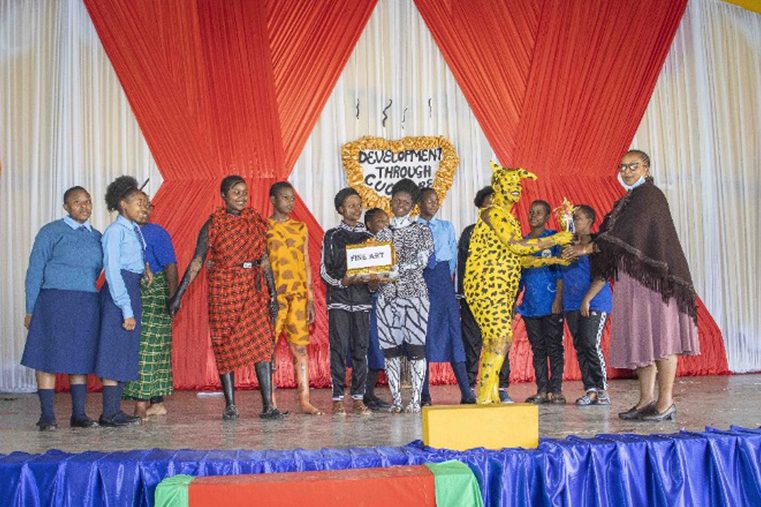
Cultural Day is a celebration unique to St Jude’s - a day full of fun, but also with an important purpose. “It’s a great way to help our students learn about their roots,” says Miss Doreen.
Like trees, our students must have healthy roots in order to grow tall and strong. To become the future leaders of Tanzania, St Jude’s students must have a deep understanding of the country’s culture.
Through events like Cultural Day, St Jude’s nurtures our students’ growth from within. As Fausta, a Form 4 students puts it, “This day builds something in our hearts.”
At The School of St Jude, receiving a St Jude’s uniform is a day of celebration for newly enrolled students. It’s the first step towards breaking the poverty cycle for these students who come from considerably poor backgrounds, yet demonstrate academic promise.
Every year, St Jude’s offers academic scholarships for three key stages of a student’s education in Tanzania; primary scholarships to support primary students from Standard 1 to Standard 7, O Level scholarships to support secondary students from Form 1 to the end of Form 4 and A level secondary scholarships to support the final two years of school, Form 5 and Form 6.
Francis is among the students recently selected to receive an academic scholarship at St Jude's. He joined in Form 5 after attending a government school for his primary and O Level education.

"I attended a government school where classrooms are overcrowded, there are few learning resources, boarding houses are without running water, and all students share one bathroom. With St Jude's, I have all the resources I need to succeed in my academic career. It's a dream come true,” says Francis.
“I’ve been raised by my grandparents. My grandmother is a housewife, and my grandfather is a casual worker who does work as it comes,” explains Francis, who aspires to be a civil engineer.
"In the next two years, I will receive free, quality education, learning the skills I'll need to become a future, community-focused leader."
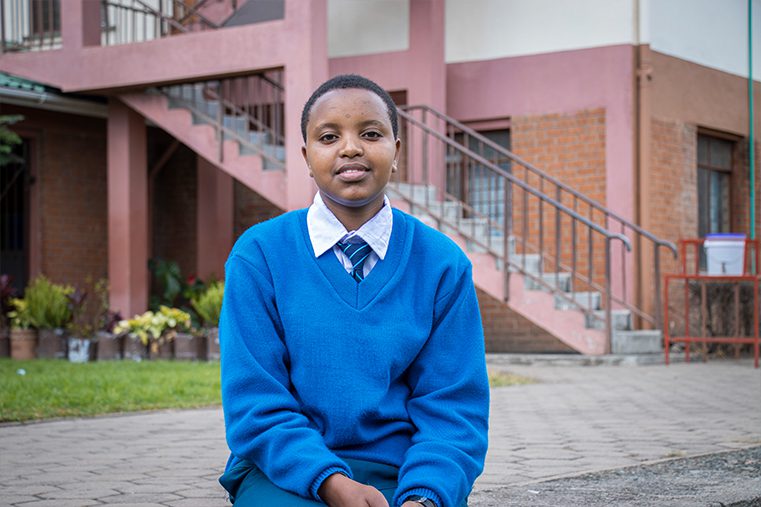
“It took me eight hours to get here from my village,” says Philipina, a Form 5 science student.
Philipina dreams of becoming a doctor. "I want to be a surgeon. When I see how doctors help the sick and save lives, I am inspired."
“This is my first time staying at boarding school and I love it here. I don’t have to worry about walking a long distance to get to school. I want to focus on my studies, fulfil my academic goals and develop my leadership skills so that I can support my family,” she adds.
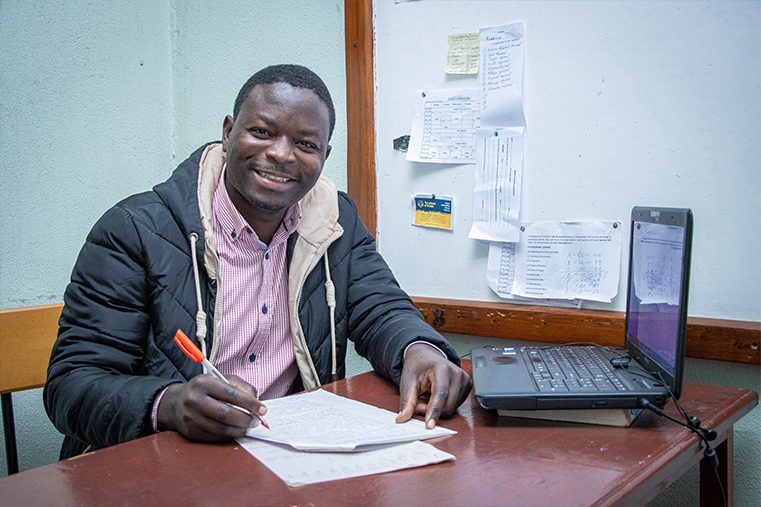
At St Jude's, teachers are passionate about helping students build self-confidence and develop leadership skills.
“For new students, we first help them become familiar with the school's core values," says Mr Joseph, a business teacher at Smith Campus.
The school has four core values which are Respect, Responsibility, Honesty and Kindness.
“Good leaders should have courage to speak in public, be honest, and demonstrate responsibility," states Mr Joseph.
"I encourage my students to learn public speaking and to compete for different leadership positions so they can practise and sharpen their leadership skills."
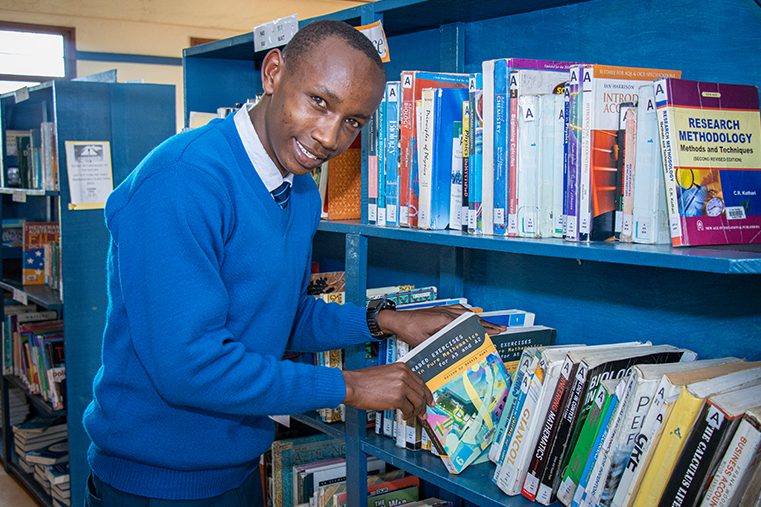
One new student ready to heighten his leadership abilities is Kelvin. As he begins his journey at St Jude's, he is looking forward to pursuing a leadership position within the student government.
"I want to run for a position as an academic prefect in the student government election," reveals Kelvin, a science student hoping to study petroleum engineering once he completes his A Level education.
“I was an academic prefect at the government school that I attended. One of the differences between being a prefect at St Jude’s and at a government school is that we get recognised at the end of Form 6," he adds.
St Jude’s honours student leaders with certificates when they complete Form 6 for outstanding leadership service.
"When I graduate, I will use the certificate to demonstrate my leadership capabilities for employment opportunities," Kelvin says proudly.
St Jude’s strives for academic and moral excellence and ensures that students attain a holistic education, providing them with a pathway out of poverty.
St Jude’s three schools are lively places. There is always laughter ringing out across the playground, or a song wafting down from a music room, or an exciting game of football being played on the sports fields, with accompanying shouts and blasts from a whistle.
To take a step into one of our three libraries is to take a pause from this hustle and bustle and enter into a calm, quiet place of focus. Students take advantage of this atmosphere for their studies, to browse the shelves or to get a recommendation from one of our trained library staff.
Mr Forehead started at St Jude’s 13 years ago as a Library Guard. After a diploma and then a Bachelor of Teaching, he became our Primary Library Teacher. He’s never met another Tanzanian with the same job. “It is not a common role,” he says. “I teach students how to utilise the library, how to find books, how to borrow and how to take care of the books.”
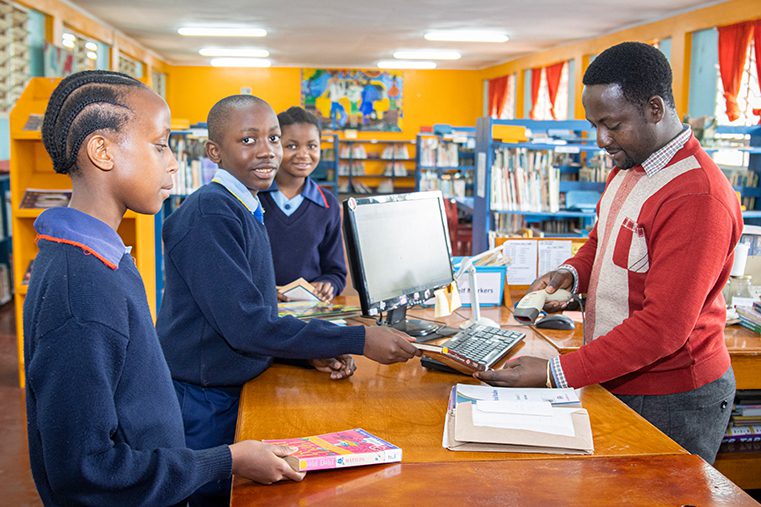
When students begin at St Jude’s in Standard 1 or 2 (the first years of primary school), it’s usually their first time in a library. “When they first arrive, they are so excited about the library,” smiles Mr Forehead.
“Reading definitely helps them to improve their English,” he explains. “You’ll see when they start, you give them a book and they’ll just know one or two words, and then over time as we read more and more it just improves so much.”
Miss Sylvia is the Library Assistant at St Jude’s Girls’ Secondary School library. She takes a keen interest in her students to help them thrive in their first four years of secondary school.
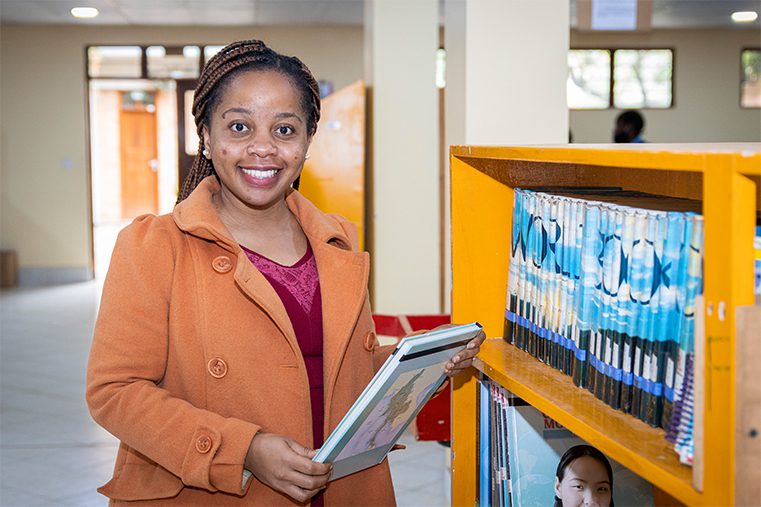
“My students are big fans of novels. The most popular books are the Twilight books by Stephanie Myer and Mortal Instruments by Cassandra Clare,” she smiles. But Miss Sylvia isn’t content to leave her students to read only the most popular books. “I get to know students and staff members, so when they visit I can tell them about the certain things they’re interested in. So, students start to think, ‘Oh, Miss Sylvia is really interested in me,’ and it makes them feel important, that I care about them.”
In the primary library, Mr Forehead gets creative to encourage reading. “The students have reading competitions and then they make presentations about what they have read. With the young ones especially, I give them stickers when they finish a book, which gives them a lot of motivation,” he says.
Mr Forehead’s enthusiasm for reading is particularly remarkable given that his own school did not have a library. “We had a few books in boxes which were kept in the headmaster’s office and if you wanted to borrow a book, you would have to ask the headmaster. A year might go by without anyone borrowing the books and then you would find they had been spoiled,” he recalls.
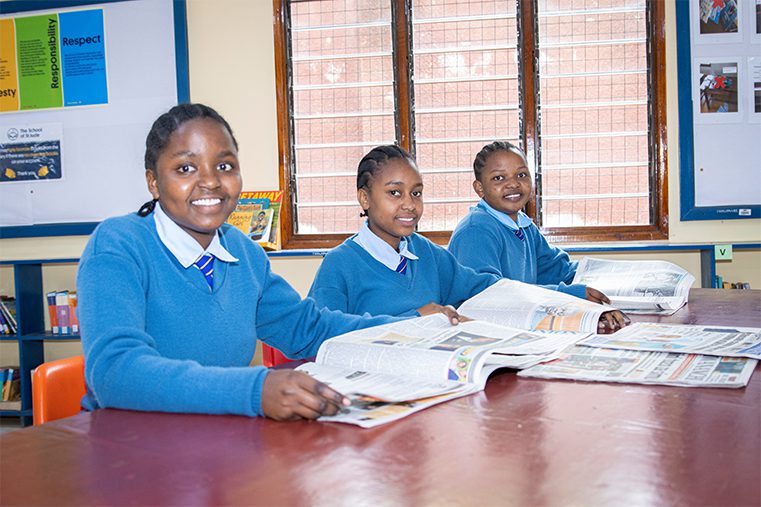
For the last two years, SCIS (Schools Catalogue Information Service) has supported St Jude’s by donating their annual licensing fee and it’s made a huge difference in our libraries. SCIS creates easy-to-download catalogue records for school libraries and is used in libraries all over the world.
“With SCIS, cataloguing is so much faster,” enthuses Miss Sylvia. “All the information about the books is there. You can just click, download, and it’s all there and all correct. It has saved so much time.”
SCIS also assisted library staff with a series of webinars in 2020 to help make the most of everything SCIS has to offer. In a country without a huge network of libraries, St Jude’s is grateful to have a link to experts in Australia for inspiration and learning.
St Jude’s students are such ravenous readers that our librarians are regularly faced with a familiar challenge. “The biggest challenge is having enough books. The students love to read, and they’ve almost read all the books,” says Mr Forehead.
Over the years, St Jude’s libraries have been stocked with books donated by generous visitors and international supporters who have sent books to Tanzania. The school prepares a ‘wishlist’ of requested books each year so that visitors who wish to donate books can bring those which will be most useful.
Unfortunately, COVID-19 has reduced the school’s annual international visitors from around 1,100 to almost zero. And no visitors means no new books. As the COVID-19 pandemic recedes, St Jude’s hopes to add new stock to its libraries.
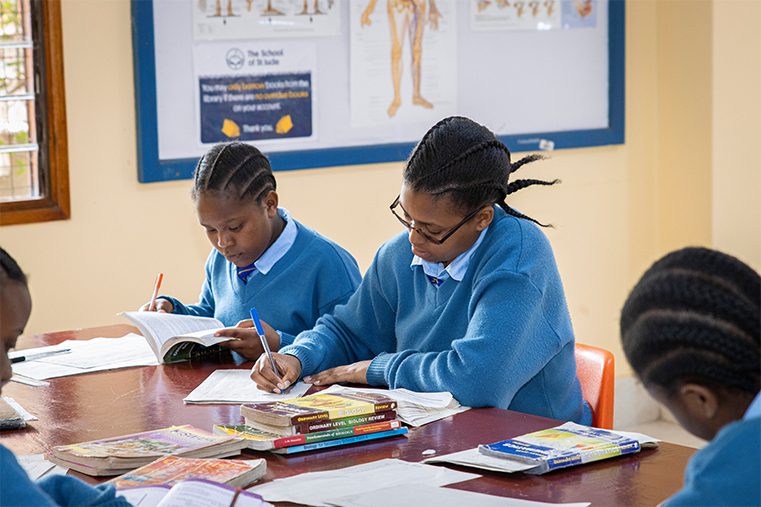
Even with the challenges they face, St Jude’s libraries have an important role at the heart of each school. They’re a place for students to discover new worlds, to catch up on the news and to study, uninterrupted. Unlike the majority of Tanzanian students, who are not afforded the advantage of a school library, St Jude’s students can enjoy all of the benefits a library offers, thanks to supporters from all around the world.